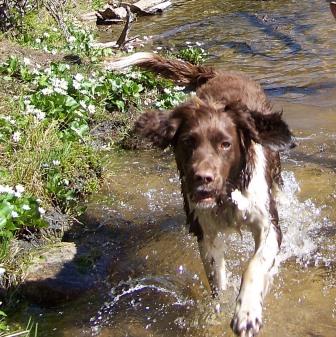Has your veterinarian asked if your dog drinks from ponds, puddles, or streams? Now, I can clearly say, no. Buffy, my blind cocker spaniel is hydrophobic. She goes out of her way to stay away from water and would never drink from it.
But when I owned my springer spaniels, we couldn’t keep them out of the water. I called Kaylee, my first springer, a wetland indicator. If there was a wetland around I’d hear a loud splash as she frolicked in the shallow water. If there was a pond, she’d swim around in circles. One time I saw her stick her head all the way into a bucket of water. Kaylee was my diving dog, while Cassie was my dabbler. Cassie didn’t like to go deeper than the middle of her chest—a wading dog, as opposed to Kaylee, my swimmer.
Back then, the vet never asked about drinking creek water. I figured they might get a bit of a belly ache, but they never did even though my springers drank tons of creek water when we took them whitewater canoeing or canoe camping. I never packed water for my dogs on these trips – they drank out of the river, which was what they preferred.

But that was before the lepto scare—before there was a vaccine.
Someday, I want to get a springer spaniel again, a water dog. But should I get the lepto vaccine?
I’ve seen a dog with lepto, short for Leptospirosis, a bacterial infection. This was back in 2006 when Cassie came down with a temporary paralysis and stayed at the emergency vet for a week. My husband and I visited her twice a day and often we’d see a couple with their children wearing gloves and petting their springer in the next cage. They wore blue lab gloves so they wouldn’t catch lepto from their dog.
Picture trying to pet your dog wearing latex gloves!
Lepto is a zoonotic disease—so people can catch it from their pets.
What is Lepto and how does your dog get it?
Leptospirosis is an infectious disease caught from contact with urine from an infected dog, rodent, raccoon, or farm animal. You can also get it from the water where the infected animal peed, or from the soil.
Symptoms don’t show up until four to twelve days later and may look like any other illness—lack of appetite, fever, lethargy, vomiting, and diarrhea. Jaundice may also occur. If left untreated, it could cause kidney failure, and possibly affect the liver and lungs.
It is most common in young to middle-aged dogs that become acutely ill. Diagnosis is with a blood test and treatment is with antibiotics. If caught early, the prognosis is good. But the disease can be fatal.
Canine Leptospirosis may be more common now than in the past. The Veterinary Journal published a study conducted from 2000 – 2014 showed an overall of 14.1% positive results with the highest of 37% in West Virginia. However, this study did not pre-screen dogs for having already had the lepto vaccine, which would yield a positive result.
What is the risk of contacting lepto?
- Do you live in a warm, wet environment? Of course, Florida is warm and wet, but what about Chicago which has warm, wet summers. Chicago has had outbreaks of lepto. But if you live in Phoenix it’s probably not a concern.
- Does your dog drink from puddles or ponds? Lepto occurs less often in moving water than stagnant water.
- Are there wild animals nearby? Your dog could possibly catch lepto from your yard if you have rats, raccoons, skunks, or opossums around. The bacteria can survive for weeks to months.
- Is your dog outside a lot?
- Do you take your dog hiking, canoeing, or swimming?
- Do you travel with your dog to areas that could harbor the lepto bacteria?
Concerns about the lepto vaccine
- The vaccine is given yearly. Every six months for high-risk dogs. Lepto is not a core vaccine, so it is optional.
- The newest vaccine only covers four of the most common of the 200 subtypes of the bacteria. So even with the vaccine, your dog could still get lepto.
- Efficacy is less than 70%.
- The vaccine may prevent illness, but not the infection. So the dog may still shed the bacteria (so other dogs (or people) can catch it).
- Reactions to the vaccine can range from mild irritation at the injection site to kidney disease, seizures, tumors, anaphylactic reaction, autoimmune disease, to catching the leptospirosis bacteria.
What should you do?
The lepto vaccine is still very controversial. Dr. Karen Becker is against using this vaccine and says she lets her dogs swim in her pond. She just watches them for symptoms (watch the video below), while other vets say to use caution (watch the second video).
Recommendations:
- Talk to your vet to find out how common lepto is in your area.
- How common are the adverse reactions to the vaccine?
- Discuss your pet’s lifestyle and likelihood of infection.
- Talk to your vet about the breeds or sizes of dogs are more susceptible to reactions. Toy dogs are more likely to have an anaphylactic reaction, golden retrievers may have a genetic marker, and puppies may be more likely to have a reaction.
- One article recommended leaving your dog at the vet for a few hours after receiving the vaccine to monitor for any reactions.
I’m still not sure what I will do when I get my springer spaniel. It will likely be a few years and maybe the controversy over the vaccine will have been resolved. Maybe I can teach a young dog not to go crazy in the water and to drink from water I provide instead of the cool lake water. I’ll just have to talk to my vet when the time arrives for the decision on whether to vaccinate or not.
How do you feel about the lepto vaccine? Leave a comment and if you like the topics that I cover, please subscribe to my blog.
To learn more, check out these links:
https://www.certapet.com/leptospirosis-vaccine/


Great to see you again Sandy! This is a terrific post and so helpful. I know it will be useful to dog owners whose animals love to swim.
I had no idea there was a risk from puddles but, these days with the environment itself at risk, I am not surprised to read posts like yours.
So this is mostly a water issue? I had to go see if this is a cat thing too. Cats can get it. My cats are primarily indoor but some of them go out on leash. None of them are likely to be drinking from puddles, and I’ll be sure now to wipe their paws if we walk in wet areas (they’d generally want in their pack carriers in that case anyway.). Ugh I didn’t want something else to worry about!
I’m not sure if they have a vaccine for cats or how prominent it is for them.
What an interesting post. I can see how this would pose a dilemma with dog owners. Sometimes it’s so hard to decide to vaccinate or not. I’m sure this will be a helpful post for many.
As the owner of indoor cats, I have never heard of this vaccine. I suppose that my inclination would be not to give my pet any vaccine that isn’t necessary. My mind might be changed if I had a water-loving dog though. It would be a tough choice that I would think long and hard about before I did it.
Kilo is not a fan of getting wet paws, never goes off leash anywhere and we have a tiny deck and yard but he does love sniffing peemail on our walks. We have lots of animals right in the city but I have not heard of any cases and our vet did not suggest the vaccine.
It’s considered a situational vaccine. Buffy isn’t vaccinated since she doesn’t drink from puddles or ponds, but I’m not sure what I will do when I get a water dog again.
Yeah, this is causing me great dilemma as well. At this time, our vet says that the serovars in our area are not included in the vaccine combo–for now. So that’s why for the time being I leaving it along.
Layla got hers this year, the only vaccine she received as we had so much rain and all the dog parks are muddy and soggy, so we decided to rather be safe than sorry plus not having a back yard dog parks are the only place she has to run without a leash. I am against vaccines in general but on the other hand when you visiting dog parks where there are 20 plus dogs I would rather we be safe especially as she is 12 years old.
It’s a hard decision to make. I hope Layla didn’t have a reaction to the vaccine.
I wish they could make the lepto vaccine more effective, and have less serious (or no!) side effects. Up till now I’ve avoided this one for my pack. We live in the city, and my dogs are 100% always supervised outdoors so I don’t worry much about them drinking strange water. We don’t really have to worry about wildlife here either. We’re hoping to move soon, though, and that might change things. I think I’m going to have to reevaluate what vaccines I get for my boys after the move. Right now I’m still very very hesitant to vaccinate for lepto, but it’s something I’m going to have to discus with their vet for sure.
They say the lepto vaccine is a situational vaccine, so now it looks like you don’t need it. I think if you can train them not to drink from puddles or ponds after you move, then you may be okay. I was never successful at that for my springers.